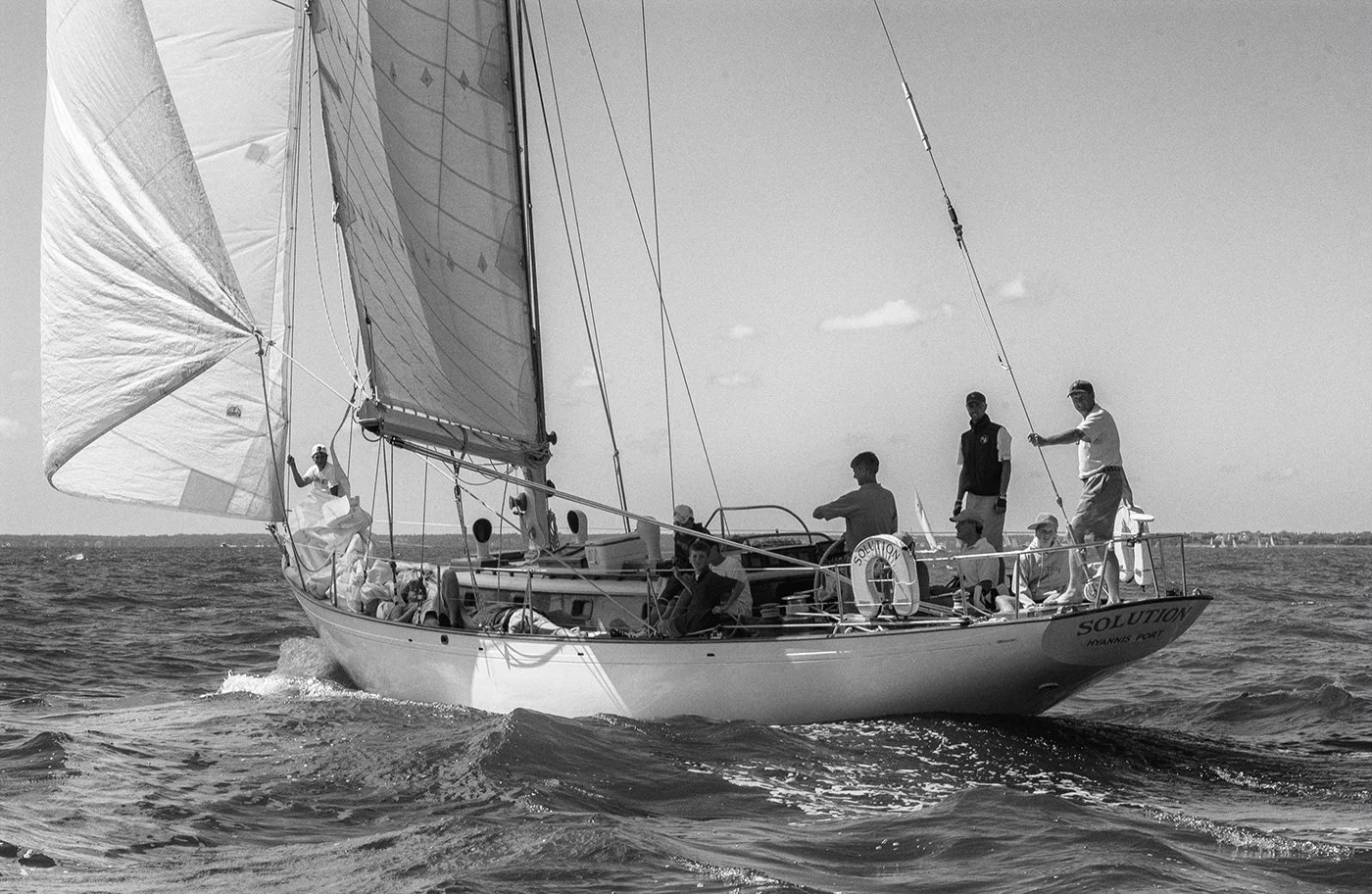Awards Time
Every week somebody seems to be getting an award for something. Its hard to tell which ones to value, and which ones come in a Wheaties Box.
But one organisation that has FULL credibility is the Cruising Club of America. It has long been considered a reliable authority on ocean sailing, and its members are considered leaders in developing and codifying best practices of the sport. Their passion for ocean voyaging has led to a body of collective knowledge that the membership freely shares in seminars, local discussion groups and has documented in books, magazine articles and digital presentations on a variety of topics.
And once a year they give out a series of awards that recognise some of the most extraordinary, unacknowledged and self-effacing sailors and adventurers on the planet.
Here’s a quick summary of the awards just announced for 2024
The Blue Water Medal, is the highest honour, is generally awarded annually to "reward meritorious seamanship and adventure upon the sea displayed by amateur sailors of all nationalities." Blue Water Medallists have included such luminaries of the sailing world as Rod Stephens, Eric and Susan Hiscock, Sir Francis Chichester, Eric Tabarly, Pete Goss and Bernard Moitessier. In 1940, the medal was presented to "the British Yachtsmen at Dunkerque." That medal can be seen at the Royal Thames Yacht Club.
In 2024 it went to Leiv Poncet of the Falkland Islands for his numerous intrepid high-latitude voyages around the world. His dedication to exploring the world’s most remote and challenging locations without fanfare exemplifies the spirit of this award.
He is the first winner of the Blue Water Medal whose parents won it previously. Jerome and Sally Poncet earned the same award in 1992 for their pioneering liveaboard voyaging in Antarctica and their publication of a handbook to voyaging in the region.
Leiv Poncet’s remarkable solo voyages over the past 25 years include his circumnavigation of the Southern Ocean, voyages from the Falkland Islands to the Aleutian Islands, and remarkable, first-ever, high latitude sea-kayaking trips. His sailing achievements are further highlighted by his use of the 38-foot steel sloop, Peregrine, a French Trireme model, which has taken him to places like South Georgia and beyond. Throughout his sailing career, Poncet has not only demonstrated exceptional seamanship but also contributed to scientific research by using Peregrine as a base for ornithologists and other scientists.
Poncet was notified of his award while cruising the South Pacific Ocean, two weeks away from the Marquesas. In his grateful reply, he said that he felt the Blue Water Medal “is not entirely mine. I am only doing what I know how to do, what I grew up doing.” The CCA acknowledges that Poncet’s love for voyaging, driven by personal passion rather than the pursuit of recognition, truly embodies the essence of the Blue Water Medal.
The CCA honors Poncet’s legacy of exploration and his continued contributions to the sailing community. His humble acknowledgment of those who inspired him and his dedication to the sea make him a fitting recipient of this year’s Blue Water Medal.
Rod Stephens Seamanship Trophy went to Carter Bacon of Cambridge, Massachusetts, for his meritorious handling of the sinking of his classic 50-foot K. Aage Nielsen sloop Solution during the return sail after the 2024 Newport Bermuda race.
Abandoning one’s 60-year-old yacht after 24 years after numerous voyages, including several races to Bermuda and a transatlantic crossing, is a difficult decision to make—comparable to losing a family member. Bacon put his crew’s safety first and foremost, which he is quick to say was an easy decision for him. For what is all too often a dangerous and chaotic event, in a carefully orchestrated manner and with expert support from the U.S. Coast Guard, Bacon and his crew abandoned Solution 200 miles off Cape Cod, bringing everyone home safely.
The CCA annually awards the Rod Stephens Seamanship Trophy to a sailor “for an act of seamanship which significantly contributes to the safety of a yacht, or one or more individuals at sea.”
Designed by K. Aage Nielsen, framed of white oak and double planked in mahogany over cedar, Bacon’s Solution was built in 1963 by Paul Luke in East Boothbay, Maine. Owners of classic yachts like Solution are less owners and more caretakers, responsible for maintaining and passing on their vessel to the next owner/caretaker. Having to make that hard decision to abandon ship was not an easy one, and something every leader can be inspired by.
Learn more about the sinking of Solution in Bacon’s own words (https://bermudarace.com/the-loss-of-solution-on-return-delivery)
Cole Brauer is the recipient of the prestigious 2024 Young Voyager Award. This award recognizes a young sailor who has made one or more exceptional voyages, demonstrating exceptional skills and courage.
Cole Brauer, a 30-year-old sailor who lives in Newport, Rhode Island, made history at the age of 29 by becoming the first American woman to sail around the world, non-stop, singlehanded. Her remarkable journey of 130 days aboard the Class 40 First Light in the Global Solo Challenge not only showcased her racing skills and seamanship but also earned her a second-place finish in the race.
More than half of Brauer’s competitors were unable to finish the race, which required sailing south around Africa, over to Australia, and across the Pacific Ocean to South America before returning north to Spain. Challenges she faced included injuring her rib after being thrown around by a massive wave, becoming severely dehydrated, and handling many boat repairs—all while informing and entertaining a social media audience that soared to nearly half a million.
Brauer, a native of East Hampton, New York, became a championship sailor while attending the University of Hawaii at Manoa. She was named the 2017 Jack Bonham Award winner, considered the most prestigious award of the university’s athletics department. While at UH, she was a member of three national championship-qualifying teams and was a two-time Intercollegiate Sailing Association Academic All-American Team member. Brauer was selected to the Dean’s List from 2013 to 2016 and was the sailing team’s top scholar-athlete in 2016, according to the university’s news department.
Her passion for the sea led her to drop plans to enroll in medical school, and she dedicated her life to sailing. In 2023 she and co-skipper Cat Chimney became the first all-female team to win the Bermuda 1-2 race, crossing the line more than 12 hours ahead of the next competitors in both legs. Brauer’s hands-on, intimate relationship with First Light, which she soloed for the first leg of the race, paid off.
The CCA recognizes that the preparation and organization required for such an endeavor are tremendous achievements on their own for a young person. Throughout her around-the-world race, Brauer captivated a tremendous following, promoting the sport of sailing and the adventurous use of the sea. Her ability to manage the duty of online documentation while navigating the world’s remote oceans inspired countless fans and brought widespread attention to the challenges and triumphs of solo sailing.
The CCA is proud to celebrate Cole Brauer’s achievements and her contribution to the sailing community. Her courage, determination, and passion for the sea exemplify the spirit of adventure and seamanship that the Young Voyager Award seeks to honor.
Finley H. Perry Jr., of Hopkinton, Massachusetts, has been awarded the Far Horizons Award for 2024. The Club’s premier sailing honor for a member, this award recognizes the sailing achievements of someone who has embarked upon a cruise or series of cruises that demonstrate the broader objectives of the Club, including the adventurous use of the sea.
After a couple decades cruising from Maine to Newfoundland in his 1949 Hinckley Sou’wester 34, Perry started looking for bigger challenges. In 1998, he purchased an Aage Nielsen 46 named Elskov and sailed her from Maine to Denmark, and up the coast of Norway to Tromsø. He sailed to Spitzbergen in 2003, reaching 80 degrees north latitude, then crossed to Iceland, southern Greenland, and Labrador.
In 2006, Perry cruised the west coast of Greenland, past Disko Bay to Uummannaq Fjord at 71 north latitude, then crossed Davis Strait and explored uncharted Hoare Bay on the Cumberland Peninsula of east Baffin Island. Baffin was “remote, wild, and cold thanks to a south-flowing current” with sea ice to contend with in its offing. The charts were nothing more than small-scale tracings of aerial photographs with no inshore soundings.
Another notable voyage, in 2013, covered 3,000 miles from Baddeck, Nova Scotia, into Hudson Strait as far as Kinngait (formerly Cape Dorset) at the southwest tip of Baffin Island. The area had been explored, and places named, by Martin Frobisher, John Davis, Henry Hudson, and a few others searching for a northwest passage to Asia in the late 1500s and early 1600s, but has been little visited in the years since—a feature that made it an attractive destination for Perry.
One tricky anchorage on Baffin Island, Balcom Inlet, was entered using sailing instructions from a whaling ship that had stopped there some 200 years ago. The area has 30-foot tides and the sailing directions stated: “Near low water heavy seas against the outgoing tidal stream break to the bottom.”
After Cape Dorset, Perry continued on to several remote, uncharted islands about which he wrote: “Ever fearful of the unknown we are exploring. Ever expecting impenetrable fogs, wicked and foul currents, strong winds, exposed anchorages, and extreme tides. We have found all this, but in manageable proportions equivalent to our meager skills and thinly spread so as to have us dealing with only one or another from time to time, but not all at once.”
Interspersed with the above voyages were numerous cruises around Newfoundland and to the Torngat Mountains region of Labrador.
Perry takes great personal interest in the geology, flora and fauna, and the native people in all the areas he has cruised. He is well versed in the history and culture of Canadian Arctic people and recognizes that he is a guest in their land, treating them with respect and kindness.











